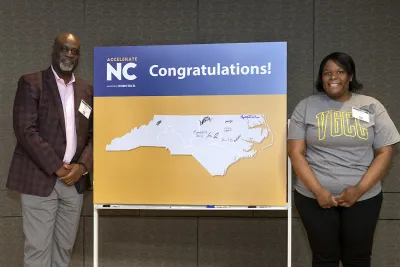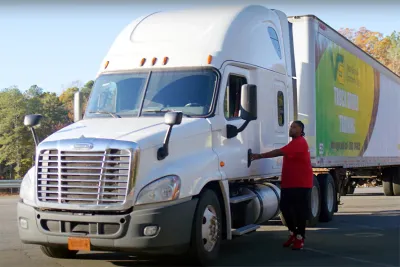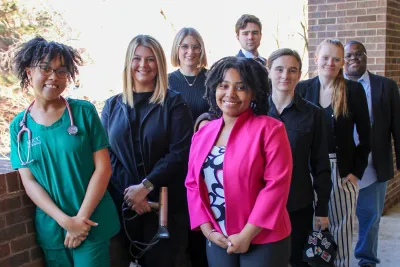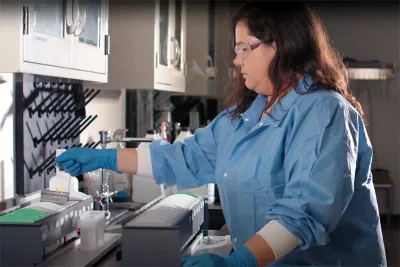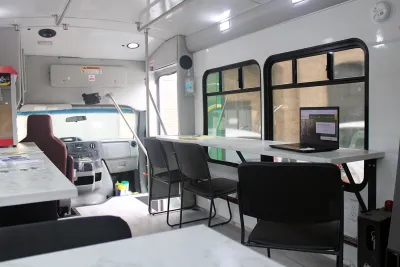Vance-Granville Community College

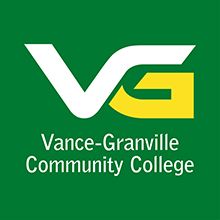
Vance-Granville Community College
YOUR COMMUNITY, YOUR COLLEGE. | Vance-Granville Community College is proud to educate, inspire, and support a diverse community of learners to achieve professional and personal success. We pledge to be a catalyst in developing strong communities where everyone experiences a fulfilling quality of life. Located in North Carolina's Triangle region, VGCC serves the counties of Vance, Granville, Franklin, Warren, and beyond!
Selected Programs at Vance-Granville Community College
Explore programs at Vance-Granville Community College. This list is curated by SkillPointe to match skills-based industries and careers that don't require a four-year degree.
Browse Training Programs (60)
Heavy Equipment Operator
Basic Wiring Certificate
Basic Wiring Certificate
Air Conditioning Heating and Refrigeration Diploma
Basic Heating & Air Certificate
Basic Welding Certificate
Intro to Welding
Welding Certification Practices
Welding Technology Certificate
Welding Technology, A.A.S.
Basic Welding Certificate
Intro to Welding
Welding Certification Practices
Welding Technology Diploma
Welding Technology, A.A.S.
Basic Welding Certificate
Intro to Welding
Welding Certification Practices
Welding Technology Certificate
Welding Technology, A.A.S.
Nurse Aide Level 1
Nurse Aide Level 2
Histotechnology, A.A.S.
Medical Assisting Diploma
Medical Assisting, A.A.S.
Medical Coding Specialist Certificate
Medical Office Administration – Coding Specialist, A.A.S.
Medical Office Administration, A.A.S.
Practical Nursing Diploma
Pharmacy Technology Certificate
Pharmacy Technology Diploma
Pharmacy Technology, A.A.S.
Phlebotomy
Computed Tomography Certificate
Radiography, A.A.S.
Culinary Arts, A.A.S.
Restaurant Hospitality Certificate
IT – Cyber Security Support Certificate
IT- Cyber Security, A.A.S.
IT – Software Specialist Certificate
IT- Diploma
IT – Cyber Security Support Certificate
IT- Cyber Security, A.A.S.
IT – Software Specialist Certificate
Electrical Systems Technology Diploma
Electrical Systems Technology Diploma
Electronics Engineering Technology, A.A.S.
Electronics Engineering Technology-Certificate
Electrical Systems Technology Diploma
Electrical Systems Technology Diploma
Electronics Engineering Technology, A.A.S.
Electronics Engineering Technology-Certificate
Industrial Wiring Certificate
Mechatronics Engineering Technology, A.A.S.
Electronics Engineering Technology, A.A.S.
Electronics Engineering Technology-Certificate
Electrical Systems Technology Diploma
Industrial Wiring Certificate
Criminal Justice and Special Populations Certificate
Criminal Justice Technology, A.A.S.
Public Safety Administration Corrections Track Degree
The Public Safety Administration curriculum is designed to provide students, as well as practitioners with knowledge and skills in the technical...
Criminal Justice and Special Populations Certificate
Criminal Justice Technology, A.A.S.
Emergency Medical Services Programs
Public Safety Administration Emergency and Fire Management Degree
The Public Safety Administration curriculum is designed to provide students, as well as practitioners with knowledge and skills in the technical...
Public Safety Administration Emergency and Fire Management Degree
The Public Safety Administration curriculum is designed to provide students, as well as practitioners with knowledge and skills in the technical...
Paralegal Technology Certificate
Paralegal Technology Diploma
Paralegal Technology, A.A.S.
Basic Law Enforcement Training Certificate
Criminal Justice and Special Populations Certificate
Criminal Justice Technology, A.A.S.
Public Safety Administration
The Public Safety Administration curriculum is designed to provide students, as well as practitioners with knowledge and skills in the technical...
Public Safety Administration Law enforcement Track Degree
The Public Safety Administration curriculum is designed to provide students, as well as practitioners with knowledge and skills in the technical...
Early Childhood Education Certificate
Early Childhood Education Diploma
Early Childhood Education, A.A.S.
Infant/Toddler Care Certificate
Human Services Technology/Substance Abuse, A.A.S.
Human Services, A.A.S.
Early Childhood Education Certificate
Early Childhood Education Diploma
Early Childhood Education, A.A.S.
Infant/Toddler Care Certificate
Automotive Systems Technology Diploma
Automotive Systems Technology, A.A.S.
Electrical Systems Automotive Certificate
Suspension and Steering Certificate
CDL-A (Truck Driver Training)
Get to Know Vance-Granville Community College
Address
Henderson, NC 27537
